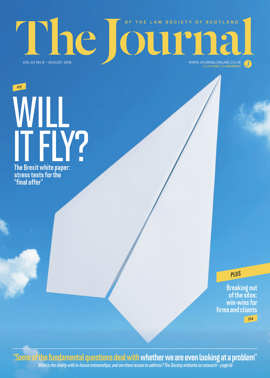Opinion: Pol Clementsmith

You may, or may not, be aware of article 13 (or the #DeleteArticle13 campaign), but this European copyright update has grave implications for just about everything we engage with and share on the internet. Article 13 of the proposed EU directive on copyright in the digital single market (COM/2016/0593 final) mandates that all content uploaded on the internet be monitored by automatic upload filters for likeness to existing copyrighted content. So, whether you are a creator or a consumer, everyone who uses the internet will be affected.
In a letter to the President of the European Parliament, the inventor of the World Wide Web, Tim Berners-Lee, along with other internet luminaries, stated: “Article 13... threatens the internet: As a group of the internet’s original architects and pioneers and their successors, we write to you as a matter of urgency about an imminent threat to the future of this global network.”
An example of the potential implications was a takedown by FIFA during the World Cup of a homemade mobile phone video of a seven-year-old boy, posted on Twitter by his mother. The video was only a few seconds long, but in the background was some slightly out-of-focus footage of a Harry Kane goal the boy was celebrating. FIFA instructed Twitter to remove the video from its server and Twitter complied.
Another video, comprising 10 hours of white noise (basically, static) put up on YouTube by music technologist and professor Sebastian Tomczak garnered five takedown notices within minutes from other “copyright holders” who just happened to have posted their “commercial” versions of white noise (surprisingly similar to the professor’s) before he did.
Article 13 also includes the use of content recognition technology: automated filters that will identify and bank potential copyright-infringing material offline. It switches the onus from the user posting the material to online platforms, which will be required to implement complex filtering systems and will be held liable for copyright infringement, potentially incurring fines that threaten their economic viability. This is an awful idea for many reasons, forcing online services and sites to act as copyright police for the film, music and publishing industries, who in turn may become the sole arbiters of what should be blocked. There is no proposed legal process; it would all happen behind closed doors and on very unequal terms.
It effectively makes online services responsible for what users post, imposing a new intermediary liability on companies. That’s not just terrible news; it contradicts the earlier EU directive on e-commerce (2000/31/EC), which laid down that companies acting as a “mere conduit” – that is, providing a platform – should not be held responsible for material posted to their sites.
First, article 13 imposes privatised censorship of all types of content: videos, blogs, info (Wikipedia), social media (Twitter, Facebook), documents (Dropbox, Google Drive), pictures (Flickr), code (GitHub) and comment sections (newspapers).
Secondly, it would mandate private filters that block before the upload and not (as currently happens) after notice.
Thirdly, it is incompatible with the Charter of Fundamental Rights and the current E-Commerce Directive.
Fourthly, it will adversely affect small players (including startups, young unknown musicians etc), and includes nothing that provides more money for creators.
Finally, it is technically unfeasible. There is no automated filter that can identify all of this content correctly and impartially and which takes fair usage into account.
Thankfully, on 5 July, the directive containing article 13 was rejected by 318 votes to 278 in the European Parliament, with 31 abstentions.
It was only because of organisations like the Open Rights Group, the Electronic Frontier Foundation and many individuals who wrote directly to their MEPs that article 13 has been stalled – for the moment. The proposed legislation was both too vague and too far-reaching, and failed to grasp how the internet operates.
Music and publishing industry lobbyists who expected article 13 to slip under the radar are now retooling for another fight in September when the (presumably revised) directive will be voted on again. We – as consumers and creators – must also brace ourselves as this sticky argument continues.
In this issue
- Acting in the best interest of the company?
- Social housing: the ground rules change
- Supporting your EU staff
- Sands run out on offshore interests
- Familiar faces not welcome
- Reading for pleasure
- Opinion: Pol Clementsmith
- Book reviews
- Profile: Robert Rennie
- President's column
- Moving from Registers Direct to ScotLIS
- People on the move
- Good on paper?
- When 1 + 1 = 3
- Voice of the child
- Curators ad litem: who pays, and for what?
- Limits of a course of conduct
- Asleep on the job?
- Affidavits – essential reading
- Prisoner privacy proportionality
- Not just a matter of form for employers
- Scottish Solicitors' Discipline Tribunal
- Keep your beneficiary nominations up to date
- See-through titles: setting the scene
- In-house traineeships: time for an in-depth look
- Public policy highlights
- Paralegal pointers
- Police interview advice: a skill to learn
- Swimming, not sinking
- The lawyer and the geek
- Ask Ash






